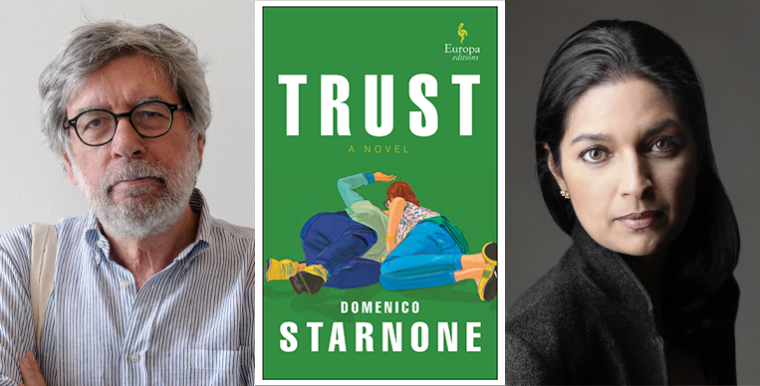This week’s installment of Ten Questions features Domenico Starnone and Jhumpa Lahiri, the author and the translator of Trust, which is out today from Europa Editions. When Pietro’s lover, Teresa, suggests that they each divulge a terrible secret, he expects that the act will bind them together for good. Instead, a few days later, they decide to bring their tumultuous three-year relationship to an end. Despite their separation, however, Pietro remains preoccupied by Teresa and the fact of her knowledge of his darkest story. He goes about his life—falls in love with a new woman, builds a successful career, constructs a polished public persona—but thoughts of Teresa reassert themselves at various turns. In subtle and dexterous prose, Starnone renders both the pleasures and anxieties that accompany desire and being known. Domenico Starnone is an Italian writer, screenwriter, and journalist. He was born in Naples and lives in Rome. He is the author of over twenty works of fiction, including Via Gemito, or First Execution (Europa Editions, 2009), winner of Italy’s most prestigious literary prize, the Strega. Jhumpa Lahiri is a writer and translator who works in both English and Italian. Her most recent novel, Whereabouts, was published by Knopf in April. She has translated two previous books by Starnone, both published by Europa Editions: Ties (2017) and Trick (2018).

Domenico Starnone and Jhumpa Lahiri, the author and the translator of Trust. (Credit: Starnone: Alamy; Lahiri: Marco Delogu)
1. How long did it take you to complete work on Trust?
Domenico Starnone: The multiple drafts kept me busy for over a year. The project itself and the preparatory notes have accompanied me for much longer.
Jhumpa Lahiri: Six months to complete the first draft, and another three months or so to revise it.
2. What was the most challenging thing about the project?
Domenico Starnone: Describing how much escapes us, how at times the person whom we most love is also the person who scares us the most, and how, in the story of our lives, we attribute great importance to certain irrelevant events simply to avoid seeing what isn’t irrelevant.
Jhumpa Lahiri: Finding solutions to translate different words for love out of Italian.
3. Where, when, and how often do you write? Where, when, and how often do you translate?
Domenico Starnone: I write all the time and wherever I can. But when it comes time to put the story down on paper, I work sitting in an armchair by the window, with the computer on my knees, until I have a full first draft. I write every day from eight in the morning until lunchtime, then from three in the afternoon until dinnertime.
Jhumpa Lahiri: I write and translate when I have time and wherever I happen to be. Usually at home or in a library. The amount of time and energy I have to devote to these activities changes from day to day given that I also teach at a university.
4. What are you reading right now?
Domenico Starnone: I’ve just finished a novel by Antonio Pascale, La foglia di fico, out in November in Italy. Each chapter mixes, in the most surprising ways, trees and human affairs. Pascale works at the Ministry of Agriculture, he is well versed in the sciences, but above all he’s a fine storyteller.
Jhumpa Lahiri: Aristotle’s Nicomachean Ethics.
5. Which author, in your opinion, deserves wider recognition?
Domenico Starnone: I’d have to give you so many names. It’s a good moment for Italian literature. Generally I’m intrigued by writers who build worlds that are distant from mine and from whom I am thereby able to learn. I’ll name two: Melania Mazzucco and Michele Mari.
Jhumpa Lahiri: Alba de Céspedes.
6. What is one thing you might change about the literary community or publishing industry?
Domenico Starnone: I would like it if books were considered more than products from which to gain, in different ways, shapes, and forms, a little profit. Books are living organisms. They want their voices to be heard, they want to discuss and be discussed. They need good readers from the very first line.
Jhumpa Lahiri: Encourage more writers to write short stories as opposed to novels.
7. What is one thing that your agent or editor told you during the process of publishing this book that stuck with you?
Domenico Starnone: “It’s a mysterious story.” I’m still thinking of the adjective mysterious, and I hope my editor meant elusive.
Jhumpa Lahiri: I began translating the book without telling my agent or editor I was doing it. In fact I waited until I was almost finished before telling Domenico that I had translated the book. I wanted to surprise him.
8. What is the biggest impediment to your creative life?
Domenico Starnone: The books that I loved and that I love deeply. I consider them so powerful that it discourages me.
Jhumpa Lahiri: The rest of my life.
9. Who is your most trusted reader of your work and why?
Domenico Starnone: My wife and my daughter. They are implacable and therefore essential.
Jhumpa Lahiri: Now that I write in Italian, Domenico is one of my most trusted readers, for the obvious reasons.
10. What’s the best piece of creative advice you’ve ever heard?
Domenico Starnone: When I was about sixteen a teacher told me not to use the adjective strange. “Don’t say something is strange, show that it is.” Since then, every now and again, I forbid myself from using some adjective or another.
Jhumpa Lahiri: One must hear the story.
Editor’s Note: Domenico Starnone’s answers appear in translation from the Italian by Jhumpa Lahiri.







